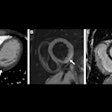Percutaneous cryoablation may be used to freeze and destroy metastatic breast cancer tumors, according to research presented at the Society of Interventional Radiology (SIR) annual meeting in San Francisco.
With this interventional radiology procedure, tiny probes are inserted with a catheter through a small cut in the skin and guided to tumors by CT or ultrasound. Pressurized argon gas is then introduced, destroying the tumor by turning it into a ball of ice. Helium gas is pumped into the catheter to help release the needle.
Dr. Peter Littrup, director of imaging core and radiology research at the Karmanos Cancer Institute in Detroit, reported the outcomes of a small study that included eight women with metastatic breast cancer in the kidney, liver, and/or lungs. The patients underwent percutaneous cryoablation, after which they did not experience local cancer recurrences.
Two of the patients survived more than five years following this treatment. The median overall survival was almost four years, Littrup said.



















